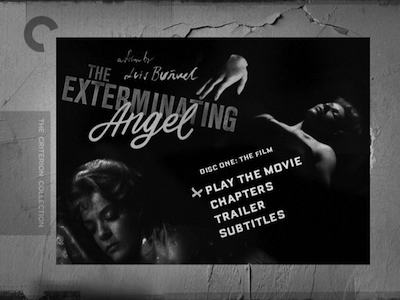
Friends of the Spanish director Luis Buñuel must have regularly taken pause before accepting his dinner invitations. In may of the cinematic prankster's films, sitting down for a meal can be the impetus for the most bizarre events. In his 1972 classic The Discreet Charm of the Bourgeoisie [review], his well-to-do diners have all manner of inconveniences inflicted upon them, not the least of which is being mowed down by machine guns. In its sibling, The Phantom of Liberty, the chairs around the dining room table are replaced by toilets. There is also apparently a rather memorable "last supper" in his 1962 film Viridiana, which gives me a serious reason to move that film forward in my review pile.
Perhaps the most extreme scenario, however, is 1962's The Exterminating Angel, in which a dinner party turns into an existential trap, one that lasts for several weeks and takes no less than three lives. Sure, more people "die" in The Discreet Charm of the Bourgeoisie, but the number of partygoers and the extent to which they are trapped in this earlier effort far outweigh what Buñuel would perpetrate a decade later.
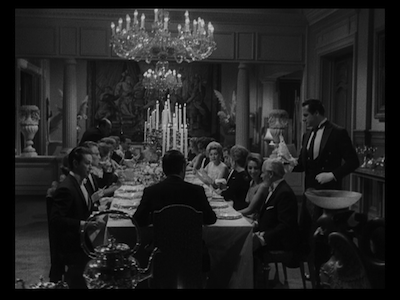
The dinner party in question is being given by Edmundo and Lucia de Nobile (Enrique Rambal and Lucy Gallardo) to celebrate an opera performance. Many of the guests are part of the opera company; others are various well-to-do friends of different occupational and political backgrounds. At the start of the evening, things already seem off. The household servants all inexplicably leave, with only the dedicated butler Julio (Claudio Brook) remaining to serve the dinner. The hostess, Lucia, is apparently known for her elaborate practical jokes, but after an accident is met with poorly by one of her more esteemed guests, she cancels her intended trick. It somehow involved a live bear and a trio of sheep. What exactly she meant to do with them is never explained.
Nor does it matter, the cosmos has a more elaborate ruse prepared for the self-absorbed, self-important gathering. Following the meal, everyone gathers in the sitting room to listen to one of the women play piano. When the song is done, it's approaching 3:00 a.m., and the guests start to grumble about leaving. Only, none of them do. Instead, one by one they lay down and fall asleep. It's only when they wake the next morning that they begin to realize how strange their own behavior has been. They make a pretense of going, but once they reach the threshold of the room, they make excuses to stay. When Julio brings them coffee and leftover meat for breakfast, he is then trapped inside the room, too. Nothing is visibly holding them in the space, but nothing can make them cross the line and leave, either.
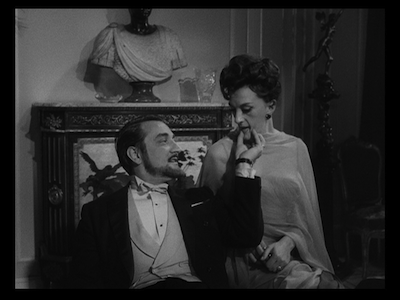
Food and water is gone rather quickly. The days pass, and so too does hygiene and proper manners. Rivalries and cruelties emerge. Some grow ill, all grow desperate. The types begin to take on their roles. Lovers hide in the closet for illicit rendezvous, while two Masons conspire. Alliances form, the hosts are blamed. One woman begins to hallucinate from the hunger. (In a memorable sequence, a dead man's hand crawls from its owner's resting place to strangle her.) One dirty old bugger tries fondling the women as they sleep. The servant keeps his cool, and so does a doctor (Augusto Benedico), who has helped many of the trapped people with previous ailments. The impossibility of the predicament is only surpassed by the improbability of their ongoing survival.
Unbeknownst to those in the house, the public has gotten wind of the bizarre happening and have gathered on the street outside. They, too, are unable to step through the gates of the estate. They don't know why, either. The only creatures free to roam the grounds are the bear and the sheep, who also seem like they might be starving. Too bad for the bear that the humans are the more dangerous predator.
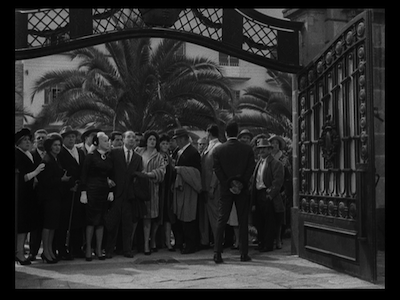
Buñuel, unsurprisingly, is having fun at the expense of the upper classes. For many, their first concern is for their own vanity, then for the loss of creature comforts. There is barely a thought given as to why this punishment might have been visited down on them. Since whatever force overtook the house compelled the servants to leave, the segregation appears to have a specific intent. As the situation worsens, even vices begin to get revealed. There's the old man, for instance, stealing kisses, and also Edmundo has some opium stashed away. One conniving, effeminate man steals the drugs and shares them with his sister, even though much of the time they also bicker between themselves. They form a faction of their own, and other factions also pop up.
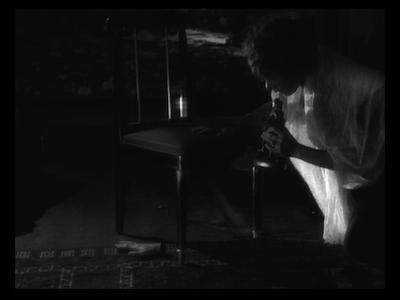
This splintering of the main collective is both realistic and necessary. It is like a drawing room version of Lord of the Flies, and my interpretation would be that Buñuel is showing these people as being trapped by their own stifling social mores and the divisive class structure they benefit from. Their own selfishness has created a vacuum. It's a limbo given shape by their willingness to follow along with the accepted way of things rather than ever questioning the morality of a society that allows so many to have so much and look down on those who don't. Buñuel extends this further in The Exterminating Angel's final scenes. As the movie closes, there is a repetition of its most bizarre circumstances, but this time tied to religion, which for Buñuel represents another confining structure man has invented for himself--and one that allows for darker forces to take command of the streets.
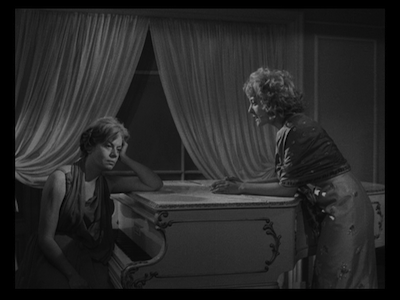
The film is shot beautifully despite being so confined. Gabriel Figueroa photographs every expensive detail of the de Nobile home, lingering on faces and clothes and allowing us to watch as both become subject to neglect and filth. Compositions tighten and the people become more confined the longer they are stuck together. The look of The Exterminating Angel and the oppressively ostentatious setting reminded me of the old Twilight Zone episode "The Masks" (1965; directed by Ida Lupino). In that show, a rich old man gathers his family together before he dies and isolates them to force them to show their true faces. Perhaps Buñuel's film had a little influence on it. Indeed, the mind boggles at the idea of Buñuel teaming with Rod Serling for an episode or two. His social satire via surrealism could have fit right in.
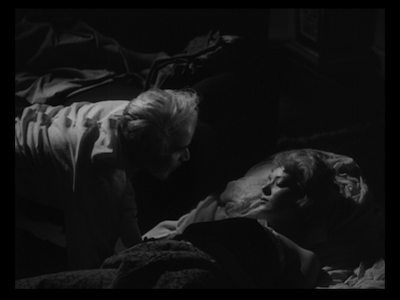
Fittingly, the group solves its joint problem by getting over their disagreements and working together. The way out is spotted by the prim blonde beauty Leticia (Silvia Pinal), who had previously been dubbed "The Valkyrie" and "The Virgin" by her so-called friends. No matter which nickname you choose, it fits symbolically. The Valkyrie comes to escort the fallen to their final resting place, the Virgin brings salvation when all humanity is lost. The fact that failure is imminent is down to Buñuel's cynical opinion of human nature more than it is his lack of faith in a porcelain beauty. After all, the man was working in motion pictures, where such a figure regularly held sway. And, hey, if you have to believe in something, why not the good-looking blonde?
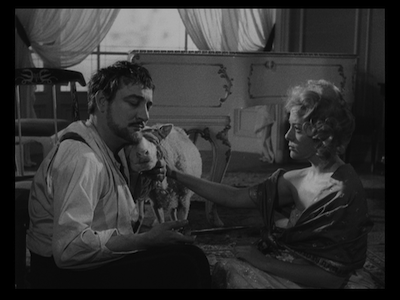

No comments:
Post a Comment